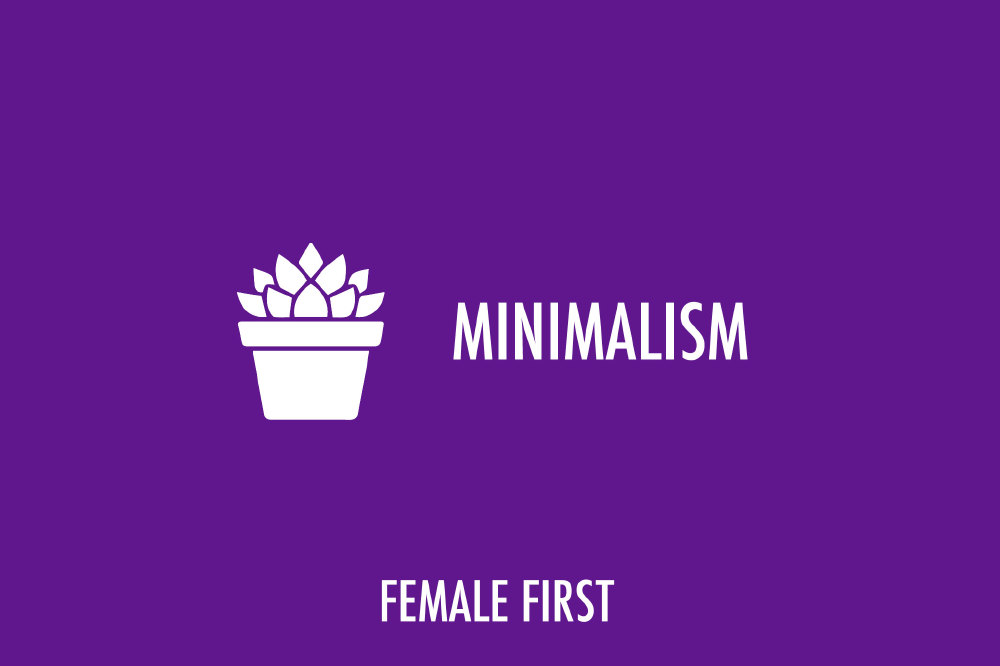In today’s busy world, it’s increasingly believed that stripping down and simplifying your lifestyle could significantly benefit your mental wellbeing. Japanese tidying expert Marie Kondo explains in her book The Life-Changing Magic of Tidying, that ‘when you put your house in order, you put your affairs, and your past in order, too’. Minimalism is not just about throwing away unwanted possessions but can be more about embracing a simpler, stress free lifestyle and establishing what is important to you.

Minimalism on Female First
Dr Megan Jones Bell, Chief Science Officer at Headspace, explains why living a minimalist lifestyle can make you more mindful and happier.
It gives you clarity of mind
We all know how rewarding it can be when we finally clear through our wardrobes and get rid of that pile of unwanted belongings that we’ve been hoarding for months or years. Decluttering not only makes your space nicer to be in, but it also gives you clarity of mind. A study carried out by DePaul University in Chicago has proven the negative impact of clutter on mental well-being, revealing it can cause increased cortisol levels, a stress hormone. Clutter can be very distracting and can stimulate your brain in negative ways without you realising.
Mindfulness is the quality of being present with both awareness and compassion. Overthinking can induce stressful thoughts and by creating a space that is simple and distraction-free, you can let go of tension and distracting thoughts in your mind.
Your home becomes your sanctuary
The fewer unnecessary possessions you hoard in your house, the more space you have to enjoy. Through minimalism, you can make your home your haven: a place you can come back to at the end of the day and feel calm and unwind in. By simplifying the space you spend time in, the area becomes a blank canvas for your thoughts, helping you to observe them more objectively with less judgment.
It increases your productivity
Professor Ferrari, from DePaul University in Chicago, found the more clutter people have, the lower their life satisfaction - and the lower their productivity. Mindfulness and meditation can not only help you be present with your emotions, but also with your activities. By starting your day with a decluttering routine, such as clearing your space, email inbox and social media feed, you can then focus on your daily tasks without distraction. This can allow you to become more focused during the rest of your day.
You regain control of own life
Lack of control in your life can be very anxiety inducing. Life, by nature, is often unpredictable; however, the possessions you buy are something you can easily curate. We have all experienced the desire to fill our wardrobes with the latest season’s clothes or to buy the most up to date technology. These items might give you a moment of gratification, but this feeling is not usually long lasting. Having a lifestyle that doesn’t rely on materialistic objects gives you the freedom to focus on what you already have.
You will do more things for yourself
In our time poor society, clearing arrangements from your schedule that hold less importance and feel unnecessary can be very empowering. When you are more selective about the activities you carry out, you become more motivated to do these things correctly and value the experience more. By cutting back on arrangements, you free up more time to check in with yourself, reflect on the week and meditate. Headspace’s variety of courses and sessions can help you unwind, reset, and restore. The spare time you create can be a great way to introduce mindfulness into your daily routine.
Additionally, by avoiding buying things you don’t need, you allow yourself more opportunities to participate in enriching experiences and hobbies that make you happy and allow you to spend more time with friends and loved ones.
To find out more visit www.headspace.com
Tagged in Minimalism

